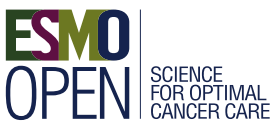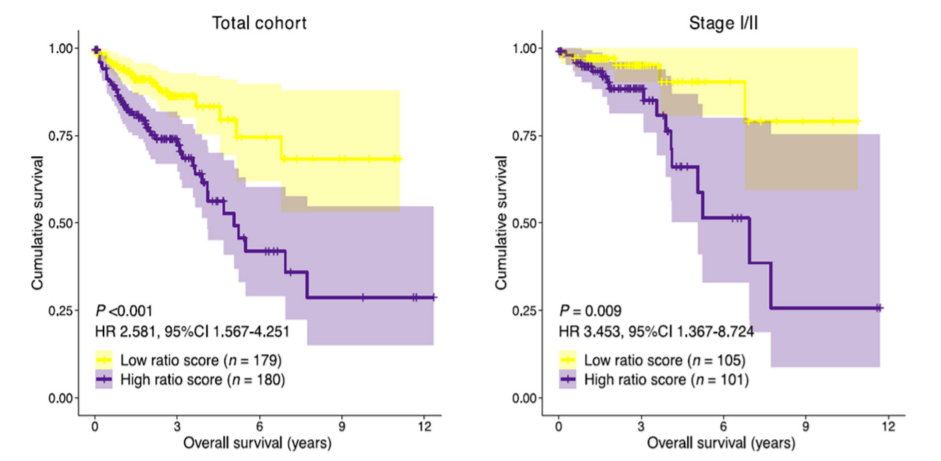News
Release
Two
Biotech Support Group Publications are Cited in a Journal Article
Validating
the Prognostic Effect of the Tumor-Stroma Ratio
MONMOUTH
JUNCTION, NJ
, May
7, 2024 -- Biotech Support Group (BSG) reports that two of their
joint authorship journal articles were cited in the supporting
discussion from the research article:
 Polack,
M., et al. "Results from the UNITED study: a multicenter study
validating the prognostic effect of the tumor–stroma ratio in colon
cancer."
ESMO
open
9.4
(2024): 102988.
Polack,
M., et al. "Results from the UNITED study: a multicenter study
validating the prognostic effect of the tumor–stroma ratio in colon
cancer."
ESMO
open
9.4
(2024): 102988.
Current
treatment guidelines for colon cancer are traditionally based on
extent of disease, expressed through the TNM (tumor-node-metastasis)
classification, as well as risk assessments for patient outcome and
expected benefits of adjuvant chemotherapy (ACT). However, the
prognostic capacity of TNM staging remains suboptimal. So there
remains a clinical need to improve individualized ACT indications
upfront through additional prognostic biomarkers. For this, the TNM
(tumor-node-metastasis) Evaluation Committee of Union for
International Cancer Control (UICC) and College of American
Pathologists (CAP) recommended to prospectively validate the
cost-effective and robust tumor-stroma ratio (TSR) as an independent
prognostic parameter, since high intratumor stromal percentages have
previously predicted poor patient-related outcomes.
The
tumor-stroma ratio (TSR) is a histopathological parameter based on
the amount of stroma expressed in percentages compared to the tumor
epithelial component, and was initially developed in colon cancer,
but has repeatedly been shown to be of prognostic value for almost
all epithelial cancers. The article concludes that the multicenter
UNITED study unequivocally validates the TSR as an independent
prognosticator, confirming worse outcomes in stroma-high patients.
The TSR improved current selection criteria for patients at risk of
events, and stroma-high patients potentially experienced chemotherapy
resistance. TSR implementation in pathology diagnostics and
international guidelines is highly recommended as aid in personalized
treatment. Importantly, future studies should focus on tumor
stroma-targeted therapeutic regimens or strategies, as this study
shows a lack of benefit of stroma-high colon cancer to ACT, revealing
a clear clinical need for new treatment options for these patients.
Similar to ACT, tumors with high amounts of tumor stroma also have
been observed to respond less to immunotherapeutic strategies.
In
the Discussion Section the article recognizes two BSG co-authored
articles, stating “Many biomarkers have emerged in the past
decades, as researchers are aiming to better predict tumor behavior
and patient outcomes. One such emerging biomarker is liquid biopsy,
measuring circulating tumor DNA strands in blood as a marker for
minimal residual disease. Even more of interest is the study on tumor
stromal liquid biopsy panels, capturing the tumor
microenvironment
38.39.” References 38 & 39 are
noteworthy contributions to the field.
38.
Kuruc M, Zheng H, Sowerhardy A, et al.
New
strategies to categorize blood for proteomic biomarker discovery
.
J Proteom Bioinform. 2020;2: 90-107.
39.
Ravensbergen CJ, Kuruc M, Polack M, et al.
The
stroma liquid biopsy panel contains a stromal-epithelial gene
signature ratio that is associated with the histologic tumor-stroma
ratio and predicts survival in colon cancer
.
Cancers (Basel). 2021;14(1):163.
From Reference 38, we describe how
chronic illness manifests itself in blood and how we might study
innate immunity to understand mechanisms that can potentially
translate into new biomarkers and therapeutic modalities. We draw
upon our own knowledgebase of proteome information reportable after
BSG’s depletion or enrichment products in LC-MS/MS workflows and
how this knowledge can be utilized in new strategies for biomarker
discovery from blood samples. We note that BSG’s products have
simply and efficiently reduced the abundance of Albumin and
Immunoglobulin allowing for cost-effective workflows, without the use
of antibody-based depletion methods.
From
the Reference 39, we highlight key results.

In
addition to patient prognosis, high stromal-epithelial gene signature
ratio-risk scores were associated with an increased proportion of
Microsatellite instability (MSI) in comparison to low ratio-risk
scores. Given the increased proportion of MSI in the high ratio risk
score group, the signature ratio might be predictive of immune
checkpoint inhibitor (ICI) therapy response in colon cancer and
should be the subject of future studies in ICI therapy-treated
patient cohorts.
This
report provides a first theoretical framework for proteomic
signatures to potentially serve as an indicator for tumor-stroma
content when applied in liquid biopsy. Ultimately, the stromal
conditioning protein blueprint, as captured by the SLB panel, may
provide a more refined stratification of the tumor and patient
prognosis, and offer new insights into therapeutic strategies that
might beneficially modulate the tumor-microenvironment.
“While
most cancer research is focused on genomic mutations, even with the
introduction of immuno-therapies, we still know very little about
individualistic hospitality to uncontrolled cellular proliferation.
The tumor-stroma ratio, developed at Leiden University Medical Center
has been at the forefront in research on the microenvironment
componentry of cancer. So it is very rewarding to see that our
strategies towards liquid biopsy and more generally, systemic chronic
inflammatory biomarkers, is being cited in groundbreaking cancer
research, such as this. BSG set out to answer whether stromal
conditioning was measurable in blood sera, to most if not all
cancers, regardless of primary tumor, stage, or metastatic disease.
This discovery research, followed from our initial proteome
characterization of our Albumin Removal products, AlbuVoid™ in
particular, and led to our panel of Stroma Liquid Biopsy™ proteomic
biomarkers. Taken together, these articles support the clinical
utility for stromal conditioning in cancer, as a further way to
stratify patients towards the best treatment options. In the future
we hope to correlate tissue level stromal conditioning and
blood-accessible proteome level stromal conditioning and welcome
collaborative inquiries for such investigation.” states Swapan Roy,
Ph.D., President and Founder of Biotech Support Group.
Click
To Learn more about BSG’s Albumin & IgG Removal Products
To
Learn More About Stroma Liquid Biopsy™, download whitepaper at:
https://www.biotechsupportgroup.com/v/vspfiles/templates/257/pdf/StromaLiquidBiopsyWhitepaper02162022.pdf
Read
Case Study:
Unleashing
the Power of Proteomics To Better Understand the
Innate Immune
Response to Infectious and Non-infectious Inflammatory Stimuli
Keywords:
colon cancer, tumor
microenvironment, tumor–stroma ratio, stromal conditioning,
disease-free survival, cancer pathology, Stroma Liquid Biopsy™
About
Biotech Support Group LLC
Converging
with cultural and technological disruptions forthcoming in
healthcare, Biotech Support Group develops methods for cost effective
and efficient sample prep essential for expanding proteomic analysis.
Following a tiered business strategy, the company continues its
growth in the consumable research products area. For this market, key
products include: AlbuVoid™ and AlbuSorb™ PLUS
for
albumin & IgG depletion, Cleanascite
™
for lipid adsorption, HemogloBind™ and HemoVoid™ for hemoglobin
removal, and NRicher™ for low abundance and family specific
proteome enrichment. For more information, go to
http://www.biotechsupportgroup.com
To
explore collaborative opportunities in Stroma Liquid Biopsy™ or
business development contact:
Matthew
Kuruc T: 732-274-2866
mkuruc@biotechsupportgroup.com

 Polack,
M., et al. "Results from the UNITED study: a multicenter study
validating the prognostic effect of the tumor–stroma ratio in colon
cancer."
Polack,
M., et al. "Results from the UNITED study: a multicenter study
validating the prognostic effect of the tumor–stroma ratio in colon
cancer."
